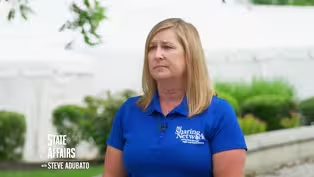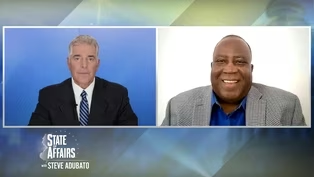State of Affairs with Steve Adubato
Mental Health Support Initiatives at Temple B’nai Jeshurun
Clip: Season 8 Episode 13 | 7m 48sVideo has Closed Captions
Mental Health Support Initiatives at Temple B’nai Jeshurun
Abra Lee, Director of Jewish Education & Learning Initiatives at Temple B’nai Jeshurun, joins Steve Adubato to discuss the work she is doing to enhance the Temple's youth mental health support by educating and creating awareness in the community.
Problems playing video? | Closed Captioning Feedback
Problems playing video? | Closed Captioning Feedback
State of Affairs with Steve Adubato is a local public television program presented by NJ PBS
State of Affairs with Steve Adubato
Mental Health Support Initiatives at Temple B’nai Jeshurun
Clip: Season 8 Episode 13 | 7m 48sVideo has Closed Captions
Abra Lee, Director of Jewish Education & Learning Initiatives at Temple B’nai Jeshurun, joins Steve Adubato to discuss the work she is doing to enhance the Temple's youth mental health support by educating and creating awareness in the community.
Problems playing video? | Closed Captioning Feedback
How to Watch State of Affairs with Steve Adubato
State of Affairs with Steve Adubato is available to stream on pbs.org and the free PBS App, available on iPhone, Apple TV, Android TV, Android smartphones, Amazon Fire TV, Amazon Fire Tablet, Roku, Samsung Smart TV, and Vizio.
Providing Support for PBS.org
Learn Moreabout PBS online sponsorship[INSPRATIONAL MUSIC STING] - Hi everyone, Steve Adubato.
We kick off the program with an important and compelling conversation with Abra Lee, who's Director of Jewish Education and Learning Initiatives at Temple B'nai Jeshurun.
Abra, great to have you with us.
- Thanks for having me.
- You know, our friends at the Healthcare Foundation introduced us to you and the work that you're doing.
Talk about the work that you're doing at the Temple as it relates to youth mental health, which is more serious than ever, particularly with the population you're dealing with and working with.
- Yes, we are incredibly grateful to our partners at the Healthcare Foundation of New Jersey.
This is a project that I have really been dreaming about for a lot of years, when I first was introduced to Youth Mental Health First Aid and really for so many reasons, it was cost prohibitive to be able to bring this kind of training and awareness into our community.
And through the generosity of the foundation, we were finally able to start this project.
We're calling the project One Community, One Goal, Youth Mental Health First, and there are three main objectives to the project.
We aim to first certify five lead educators as instructors in mental health first aid.
Then we're gonna certify 85 classroom teachers and 125 teens in mental health first aid.
We will also plan to host a speaker series for families so that we can raise awareness and begin this conversation so we can start to end the stigma.
- Let me also disclose the Healthcare Foundation, a long time underwriter of our healthcare programming.
But Abra, let me, let's get at this.
How much worse is the mental health problem since October 7th, the horrific, barbaric attacks by Hamas in Israel, and since the war in Gaza?
As we're doing this program it'll be seen after that.
How much worse is the problem for the young people at Temple B'nai Jeshurun?
- Well, in our community, we started to see the rise in antisemitism even before the war began.
And this really has magnified that in ways that we never anticipated in our area, in Essex County, New Jersey.
Our partner synagogues are right next door to us in Union.
And the fear and the trauma that Jewish youth are experiencing right now is something that we haven't seen in generations.
- Describe more specifically what those young people are facing.
- Well, we know the impact of social media on our teens, and you know, most of our students are receiving their Jewish education in part-time synagogue schools, and with very few hours in a week, we really can't get to everything we want them to be able to know.
And what we've discovered in this last several months is their understanding of the history of the conflict in Israel is very limited.
So they're not equipped to be able to answer the questions that they have, that their friends have.
They're not equipped to respond to what they're seeing in the media and in social media and when friends say something in a classroom.
They just don't have the tools that they need to be able to deal with this.
So we immediately shifted our curriculum, most schools did, in addressing the history of the conflict and trying to help them to understand what they're hearing.
- Well, but how is that a mental health issue?
- Many of our students have family or some connection to Israel.
It is our spiritual homeland.
And seeing the ongoing war in a place that we've called home has impacted both our youngest students.
We have seven-year-olds who are asking us now, "Why do people hate Jews?"
That's never a question I thought as an educator I'd ever have to answer to a seven-year-old.
Teens, we've been having this conversation for years, but not the young children.
They don't understand the hate.
They have mostly been taught about Israel in a modern state, culturally.
We say often that we have taught our children that Israel is about falafel and camels and everything is beautiful and it's Jewish Disneyland.
And when the reality of war and conflict and this history that goes back to biblical times is just punching them in the gut.
They really don't understand what to do with this.
- I'm gonna put things in perspective for folks, for people saying, wow, you're talking about the rise in antisemitism, the impact that this is having on young people in your temple and Jewish communities and for Jewish young people across the state, the region, the country.
We also know clearly there are Palestinian children who are struggling.
There is a rise in Islamophobia.
They are not mutually exclusive.
So to be clear, we'll continue our programming to try to help young people, particularly young people disproportionately impacted by the events since October 7th.
To that end, Abra, if these young people that you're talking about don't get the help that you and your colleagues are trying to provide at Temple B'nai Jeshurun, what, I don't wanna be an alarmist, but they could face serious problems down the road if these issues are not addressed now.
- The fear and the lack of understanding leads to isolation.
The isolation, as we know, has a terrible impact.
We saw this with the COVID-19 pandemic, and- - Depression?
- Depression, and it has often led to substance use issues.
This is an ongoing mental health crisis that has just been magnified by what's been going on in our community.
- And again, to go back to this, it isn't a question of wanting to be helpful, it's a question of having the means to hire the staff to train the appropriate mental health professionals.
So it isn't, you know, "Why aren't you dealing with this?"
It's, "What does it take to deal with it?"
Is that a fair assessment?
- That's right.
That's right.
- Abra Lee is the director of Jewish Education and Learning Initiatives at Temple B'nai Jeshurun.
And Abra, this is a very important conversation.
We appreciate your time and the work that you and your colleagues are doing.
- Thank you so much.
- You got it.
Stay with us, we'll be right back.
- [Narrator] State of Affairs with Steve Adubato is a production of the Caucus Educational Corporation.
Celebrating 30 years in public broadcasting.
Funding has been provided by The Healthcare Foundation of New Jersey.
RWJBarnabas Health.
Let’s be healthy together.
Horizon Blue Cross Blue Shield of New Jersey.
Valley Bank.
The Russell Berrie Foundation.
Robert Wood Johnson Foundation.
The Turrell Fund, a foundation serving children.
IBEW Local 102.
And by The Adler Aphasia Center.
Promotional support provided by New Jersey Globe.
And by NJBIZ.
- I’m very grateful that I’m still here.
- That’s me and my daughter when we went to celebrate our first anniversary.
- With a new kidney I have strength.
- They gave me a new lease on life.
- I’m still going everywhere and exploring new places.
- Nobody thought I was going to be here, nobody.
- I look forward to getting older with my wife, that’s possible now.
- [Narrator] We’re transforming lives through innovative kidney treatments, living donor programs, and world renowned care at two of New Jersey’s premiere hospitals.
- They gave me my normal life back.
It’s a blessing.
- [Narrator] RWJBarnabas Health.
Let’s be healthy together.
Carolyn Welsh Highlights the "Say YES Save Lives" Campaign
Video has Closed Captions
Clip: S8 Ep13 | 9m 26s | Carolyn Welsh Highlights the "Say YES Save Lives" Campaign (9m 26s)
Digital Journalism and Ethical Reporting Practices
Video has Closed Captions
Clip: S8 Ep13 | 11m 10s | Digital Journalism and Ethical Reporting Practices (11m 10s)
Providing Support for PBS.org
Learn Moreabout PBS online sponsorship
- News and Public Affairs

Top journalists deliver compelling original analysis of the hour's headlines.

- News and Public Affairs

FRONTLINE is investigative journalism that questions, explains and changes our world.












Support for PBS provided by:
State of Affairs with Steve Adubato is a local public television program presented by NJ PBS

